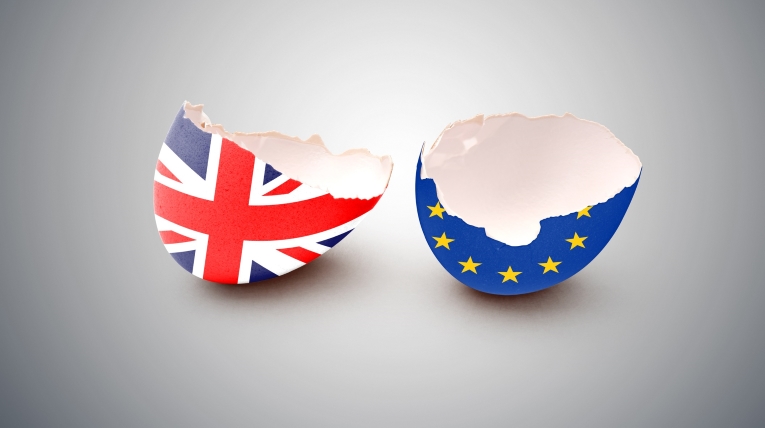What could Brexit mean for the UK's food and restaurant sectors?

Posted: Thu 23rd Aug 2018
With the Brexit deadline fast approaching, the food and drinks industry is facing significant changes. Anx Patel, founder and CEO of GoKart, provides his insight into the challenges currently facing the sector, and shares his advice to help businesses overcome them.
The UK's private sector is facing a host of new challenges as a result of the country's changing political and economic climate.
With Brexit scheduled for March 2019, businesses across all industries need to ensure they are adequately prepared to manage any sudden market shocks, which could affect their internal operations and overall delivery of a service or product.
The country's food and drinks sector is already beginning to feel the pressure. Growing speculation of a no-deal Brexit, a scenario where the UK would leave the EU without a withdrawal agreement in place, has brought into question the future state of trade standards and regulations.
In turn, this would pose the issue of how the country would manage its future food imports and exports. Indeed, the National Farmers Union warned in early August that Britain could run out of food in 12 months if it cannot easily receive imports from the EU and elsewhere.
Of course, nothing is certain at this stage, but no options have been taken off the table either. Based on my own experience working closely with UK restaurants and suppliers, I have witnessed first-hand the challenges affecting those in the sector.
To ensure the food and drinks industry is suitably prepared for Brexit, businesses need to familiarise themselves with the key issues affecting the market and consider how they could overcome them.
Brexit and the potential of a no deal
The future of trade remains uncertain for the moment; however, a 'no deal' scenario would see the UK reverting back to WTO tariffs.
With the prospect of new tariffs and other barriers to trade, many in the food and drink industry are understandably disheartened. Naturally, the strain is greatest on those who source large quantities of their products and ingredients from the EU.
The trading relationship between the UK and other EU member states has seen the exchange of huge volumes of food products. In fact, the Food and Drink Federation suggests that only 49% of food consumed in the UK is actually produced locally, with the remaining 51% coming from imports.
As the UK's biggest trading partner, up to 30% of the country's food supply comes from the EU's Single Market.
A market shock triggered by a no deal will certainly be felt throughout the food industry. Food prices will likely rise in response, as farmers and producers respond to an increase in national demand while also taking into account any new tariffs that could come into force.
However, we can remain hopeful that the UK will succeed in securing new trading partners outside of Europe - or better yet, re-negotiating new terms of trade with the EU to reduce the disruption that could be caused by Brexit.
That being said, despite the somewhat gloomy forecast the UK food and drink sector has proven resilient. A government report recently revealed that the industry witnessed a massive 93% export growth between 2007 and 2017 maintaining an annual growth rate of 7%.
As the largest manufacturing sector in the UK, the challenges and concerns facing the food industry through Brexit must be addressed as part of the negotiations currently taking place. Moreover, the government must be open and transparent about the shape and form Brexit is likely to take, ensuring businesses in the sector can effectively plan for the future.
Declining value of the pound
Question marks around food imports will be one of the major concerns for UK businesses as Brexit draws nearer; another will be the strength of the pound. Over two years on since the EU referendum, the value of sterling has dropped overall by 10% against the US dollar.
With so many of our products and ingredients coming from overseas, the declining value of the pound means it has become increasingly more expensive for businesses to purchase food products from suppliers.
There are two likely outcomes that could arise from this: profit margins will shrink, while the cost of food products and meals will almost certainly have to rise.
Small, independent business involved in the food and drinks sector could suffer the most; while sizeable businesses such as high street restaurant chains typically have a large chain they can draw from, local and independent establishments will not enjoy such luxuries.
The challenge, therefore, is for SMEs, particularly independent outlets, to assess how they can remain as competitive as possible, thereby ensuring they can adapt to the changing market conditions that could be brought on by Brexit.
What can small businesses do?
There are a number of ways that small businesses within the food and drinks sectors can keep their food costs down.
One of the most obvious is to ensure more of their ingredients come from the UK, which significantly reduces the chances of inflated prices due to trade tariffs or the declining value of the pound.
To support local food production and strengthen security in the food chain, a renewed focus on sourcing local ingredients is needed.
Switching to national suppliers will relieve the industry of the increasing pressure of sourcing international ingredients, while at the same time directly benefiting domestic farmers and food manufacturers.
Regardless of where ingredients are currently being sourced from, it would be beneficial for all businesses to prepare for potential disruption to their supply chains and inventories rather than taking a 'wait and see; approach.
Having a good understanding of current costs and the potential impact of Brexit on these figures will allow business owners to identify the areas where they can minimise their expenditure.
Opportunities to reduce transport, duty or handling costs may come to light after some planning. And for those operating on a just-in-time supply chain, preparation could mean increasing your inventory to ensure that you have ample stock to continue business as usual even if you find yourself facing delays or disruptions.
With inevitable changes to the terms on which food and drink are traded between the UK and EU, it is also advisable to undertake some mitigating actions to manage disruptions within the trading environment. The EU's 'rules of origin' regulations currently gives UK businesses seamless access to the Single Market.
To maintain preferential access to trade and assure their partners that ingredients are produced locally and are of good quality, it is important that food and drink manufacturers continue to abide by these high labelling standards following Brexit.
Furthermore, it is important to recognise that businesses also have access to a wide range of new technologies that allows them to remain competitive and overcome the challenges posed by Brexit.
From online delivery platforms to reach more customers through to digital solutions to make it quicker and cheaper to order fresh, high-quality ingredients, it is vital that business owners explore the options available to them.
Being mindful of simple ways to reduce costs and strengthen your supply chain is key to for the food and drinks sector as it adapts to any potential fallout arising from Brexit.
As is true in so many sectors, technology has a vital role to play in helping businesses to overcome the challenges they face. It is down to the leaders of those businesses to identify which solutions could most benefit them.
Get business support right to your inbox
Subscribe to our newsletter to receive business tips, learn about new funding programmes, join upcoming events, take e-learning courses, and more.
Start your business journey today
Take the first step to successfully starting and growing your business.
Join for free
